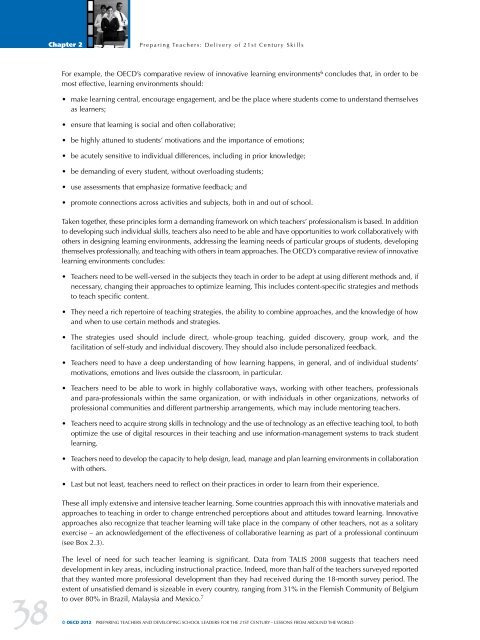Preparing Teachers and Developing School Leaders for the 21st Century
Preparing Teachers and Developing School Leaders for the 21st Century
Preparing Teachers and Developing School Leaders for the 21st Century
Create successful ePaper yourself
Turn your PDF publications into a flip-book with our unique Google optimized e-Paper software.
38 ©<br />
Chapter 2<br />
<strong>Preparing</strong> teachers: delivery of <strong>21st</strong> century skills<br />
For example, <strong>the</strong> OECD’s comparative review of innovative learning environments 6 concludes that, in order to be<br />
most effective, learning environments should:<br />
• make learning central, encourage engagement, <strong>and</strong> be <strong>the</strong> place where students come to underst<strong>and</strong> <strong>the</strong>mselves<br />
as learners;<br />
• ensure that learning is social <strong>and</strong> often collaborative;<br />
• be highly attuned to students’ motivations <strong>and</strong> <strong>the</strong> importance of emotions;<br />
• be acutely sensitive to individual differences, including in prior knowledge;<br />
• be dem<strong>and</strong>ing of every student, without overloading students;<br />
• use assessments that emphasize <strong>for</strong>mative feedback; <strong>and</strong><br />
• promote connections across activities <strong>and</strong> subjects, both in <strong>and</strong> out of school.<br />
Taken toge<strong>the</strong>r, <strong>the</strong>se principles <strong>for</strong>m a dem<strong>and</strong>ing framework on which teachers’ professionalism is based. In addition<br />
to developing such individual skills, teachers also need to be able <strong>and</strong> have opportunities to work collaboratively with<br />
o<strong>the</strong>rs in designing learning environments, addressing <strong>the</strong> learning needs of particular groups of students, developing<br />
<strong>the</strong>mselves professionally, <strong>and</strong> teaching with o<strong>the</strong>rs in team approaches. The OECD’s comparative review of innovative<br />
learning environments concludes:<br />
• teachers need to be well-versed in <strong>the</strong> subjects <strong>the</strong>y teach in order to be adept at using different methods <strong>and</strong>, if<br />
necessary, changing <strong>the</strong>ir approaches to optimize learning. this includes content-specific strategies <strong>and</strong> methods<br />
to teach specific content.<br />
• <strong>the</strong>y need a rich repertoire of teaching strategies, <strong>the</strong> ability to combine approaches, <strong>and</strong> <strong>the</strong> knowledge of how<br />
<strong>and</strong> when to use certain methods <strong>and</strong> strategies.<br />
• <strong>the</strong> strategies used should include direct, whole-group teaching, guided discovery, group work, <strong>and</strong> <strong>the</strong><br />
facilitation of self-study <strong>and</strong> individual discovery. <strong>the</strong>y should also include personalized feedback.<br />
• <strong>Teachers</strong> need to have a deep underst<strong>and</strong>ing of how learning happens, in general, <strong>and</strong> of individual students’<br />
motivations, emotions <strong>and</strong> lives outside <strong>the</strong> classroom, in particular.<br />
• teachers need to be able to work in highly collaborative ways, working with o<strong>the</strong>r teachers, professionals<br />
<strong>and</strong> para-professionals within <strong>the</strong> same organization, or with individuals in o<strong>the</strong>r organizations, networks of<br />
professional communities <strong>and</strong> different partnership arrangements, which may include mentoring teachers.<br />
• teachers need to acquire strong skills in technology <strong>and</strong> <strong>the</strong> use of technology as an effective teaching tool, to both<br />
optimize <strong>the</strong> use of digital resources in <strong>the</strong>ir teaching <strong>and</strong> use in<strong>for</strong>mation-management systems to track student<br />
learning.<br />
• teachers need to develop <strong>the</strong> capacity to help design, lead, manage <strong>and</strong> plan learning environments in collaboration<br />
with o<strong>the</strong>rs.<br />
• last but not least, teachers need to reflect on <strong>the</strong>ir practices in order to learn from <strong>the</strong>ir experience.<br />
<strong>the</strong>se all imply extensive <strong>and</strong> intensive teacher learning. some countries approach this with innovative materials <strong>and</strong><br />
approaches to teaching in order to change entrenched perceptions about <strong>and</strong> attitudes toward learning. innovative<br />
approaches also recognize that teacher learning will take place in <strong>the</strong> company of o<strong>the</strong>r teachers, not as a solitary<br />
exercise – an acknowledgement of <strong>the</strong> effectiveness of collaborative learning as part of a professional continuum<br />
(see Box 2.3).<br />
<strong>the</strong> level of need <strong>for</strong> such teacher learning is significant. data from talis 2008 suggests that teachers need<br />
development in key areas, including instructional practice. indeed, more than half of <strong>the</strong> teachers surveyed reported<br />
that <strong>the</strong>y wanted more professional development than <strong>the</strong>y had received during <strong>the</strong> 18-month survey period. <strong>the</strong><br />
extent of unsatisfied dem<strong>and</strong> is sizeable in every country, ranging from 31% in <strong>the</strong> flemish community of Belgium<br />
to over 80% in Brazil, Malaysia <strong>and</strong> Mexico. 7<br />
OECD 2012 PreParing teachers <strong>and</strong> develoPing school leaders <strong>for</strong> <strong>the</strong> <strong>21st</strong> century – lessons froM around <strong>the</strong> World


